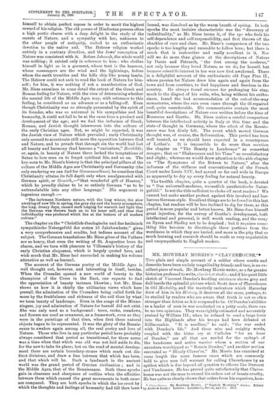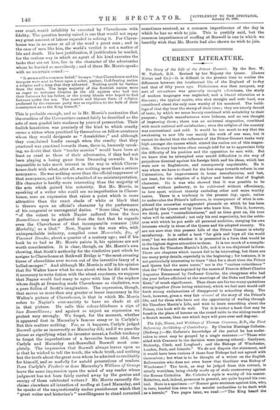MR. MOWBRAY MORRIS'S " CLAVERHOUSE."* Tins plain and simple account
of a soldier whose merits and demerits have been unduly magnified by friends and foes, is an ex- cellent piece of work. Mr. Mowbray Morris writes, as a far greater historian professed to write, sineird et studio; and if his quiet little sketch of Viscount Dundee's bustling existence shows grey and dull beside the splendid picture which Scott drew of Claverhonse in Old Mortality, and the masterly caricature which Macaulay drew of him in his History, it deserves all the more, perhaps, to be studied by readers who are aware that truth is not so often stranger than fiction as it is supposed to be. Of Dundee's abilities as a leader of men in war conducted on a petty scale, there can be no two opinions. They were rightly estimated and accurately praised by William III., when be refused to send a large force into the Highlands after his troops had been defeated at Killiecrankie. "It is needless," he said ; "tine war ended with Dundee's life." And these wise and weighty words, coupled with the bitter cry at Culloden " for an hour of Dundee," are all that are needed for the epitsp4 of the handsome and active warrior whom a section of our ancestors worshipped as "Bonnie Dundee," and another section execrated as " Bloody Claver'se." Mr. Morris has examined at some length the more famous cases which are commonly held to give men full warrant for calling Claverhouse by an epithet which is due beyond all question to officers like Davoust and Vandamme. He has proved quite satisfactorily that Claver- house was not the man to exceed his orders out of innate cruelty. He has quite as clearly shown that orders from his superiors, how-
• Clarerhouse. By Mowbray Morris. (" English Worthies" tteries. Edited by Andrew Lang.) London; Longman,, Green, and Co. 1837.
ever cruel, would infallibly be executed by C'laverhouse with fidelity. The question hereby raised is one that would not repay any great amount of labour expended in solving it. For Clever- house was in no sense at all of the word a great man ; and in the case of men like him, the world's verdict is not a matter of life and death. His best justification, if justification be needed, for the zealous way in which an agent of his kind executes the tasks that are set him, lies in the character of the adversaries whom he harried so mercilessly ; and of these Mr. Morris speaks with no uncertain sound :—
" It seems still a common belief," he says, "that Claverhouse and his troopers were sent to force upon a sober, patient, God-fearing nation a religion and a king that they abhorred. Nothing could be farther from the truth. The large majority of the Scottish nation were as eager to welcome Charles as the old squires who had lost their fortunes for his father, or the young bloods who hoped to find fortaaes under the son. The narrow and blatant form of religion professed by the extreme party was as repulsive to the bulk of their countrymen as to the King himself."
This is probable enough, and so is Mr. Morris's contention that the cruelties of the Covenanters cannot fairly be described as the acts of men goaded into madness by years of persecution. Their foolish fanaticism was precisely of the kind to which cruelty seems a virtue when practised by themselves on fellow-creatures whom they would designate as " Amalekites ;" and although they complained loudly enough when the cruelty that they practised was practised towards them, there is, humanly speak- ing, no doubt that their "tender mercies" would have been at least as cruel as those of their adversaries, if they had not been playing a losing game from Drumclog onwards. It is impossible to take much interest in the way in which Claver- house dealt with what, after all, was nothing more than a serious annoyance. He was nothing more than the official suppressor of that annoyance, and his orders admitted of no misinterpretation.
His character is hardly more interesting than the majority of the acts which gained him notoriety. But Mr. Morris, in speaking of a writer who could see no imperfection in Clever- house, uses an expression that raises a point which is more attractive than the exact shade of white or black that is thrown upon an official's character by the performance of his congenial or uncongenial duties. "Some idea," he says, "of the extent to which Napier suffered from the Ines Botwelliana may be gathered from the fact that he regards even the Claverhouse of that incomparable romance [Old
Mortality] as a libel." Now, Napier is the man who, with unimpeachable industry, compiled some Memorials, 4-c., of
Viscount Dundee, about a quarter of a century ago ; and if his book be so bad as Mr. Morris paints it, his opinions are not worth consideration. It is clear, though, on Mr. Morris's own showing, that Scott's authority for the vindictive part which he assigns to Claverhonse at Bothwell Bridge is "the most amazing tissue of absurdities ever woven out of the inventive fancy of a ballad-monger." And although Mr. Morris is stiff in his opinion that Sir Walter knew what he was about when he did not deem it necessary to write fiction with the nicest exactness, we suppose that Napier would find many to agree with him if the nephew whose death at Drumclog made Claverhonse so vindictive, was a pure fiction of Scott's imagination. The expression, though, that moves us more than any greater or lesser inaccuracy in Sir Walter's picture of Claverhonse, is that in which Mr. Morris refers to Napier's over-anxiety to have no shade at all in that picture. He calls this colour-blindness a sign of lass Boswelliana ; and against so unjust an expression we protest very strongly. We forget, for the moment, whether it appeared first in Macaulay's famous essay or in Carlyle's- Bat this matters nothing. For, as it happens, Carlyle judged Boswell quite as incorrectly as Macaulay did; and if we pass the phrase as signifying what its inventor meant, a foolish tendency to forget the imperfections of a favourite human idol, then Carlyle and Macaulay out-Boswelled Boswell most com- pletely. The impression that Boswell always leaves upon us is that he wished to tell the truth, the whole truth, and nothing but the truth about the great man whom he admired so creditably for himself, and so usefully for untold generations of readers. Does Carlyle's Frederic or does Macaulay's William. of Orange leave the same impression upon the mind of any reader whose judgment has not been fairly carried away by the genius and energy of these celebrated writers ? Mr. Morris earnestly dis- claims elsewhere all intention of scoffing at Lord Macaulay, and he speaks of the unquestionably undue punishment which that "great writer and historian's" unwillingness to stand corrected
sometimes received, as a common impertinence of the day in which he has no wish to join. This is prettily said, but the common impertinence of scoffing at Boswell is one in which we heartily wish that Mr. Morris had also shown no wish to join.



















































 Previous page
Previous page